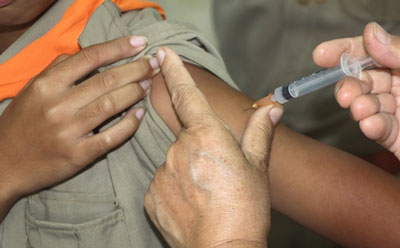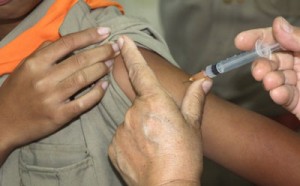Sanofi Pasteur’s dengue vaccine candidate safely protects pre-adolescents
Posted: 28 July 2015 |
New data analyses provide a comprehensive picture of the potential public health impact of vaccinating pre-adolescents and adults against dengue…


New data analyses provide a comprehensive picture of the potential public health impact of vaccinating endemic populations from pre-adolescence to adulthood against dengue.


Not only is this the largest population at risk of dengue globally, but individuals 9 years of age and older also represent a highly mobile group capable of spreading disease more broadly during outbreaks and also contributing substantially to the economic burden of dengue, for example in number of lost school and work days due to the disease.
The data comes from a new pooled efficacy analysis of individuals 9 years of age and older at vaccination from the two Phase III studies of Sanofi Pasteur‘s dengue vaccine. The new analysis documented that the vaccine protects two-thirds of these individuals (66%) against dengue, providing even greater protection against two clinically-relevant manifestations of dengue, namely severe dengue (93%) and prevention of hospitalisations due to dengue (80%) that account for the greatest human and economic burden of dengue in endemic countries. In addition, the dengue vaccine candidate protected volunteers 9 years of age and older who were previously exposed to dengue (82%), as well as those who were naïve to dengue (52.5%) prior to vaccination.
The clinical development programme for the vaccine candidate includes studies with four-year, long-term follow-up phases, in line with WHO guidelines for dengue vaccine development. Results from first 25 months of the two Phase III efficacy studies were published in 2014. Interim data from the third year of these studies and interim data from the third and fourth years of the Phase II extension study in Thailand confirm the continuing reduction of hospitalised dengue in the vaccinated population 9 years of age and older.
The third-year interim data from the Asian Phase III study identified the need for further long-term surveillance in children under 9 years of age to assess the impact of the dengue vaccine candidate in these younger children.
The dengue vaccine candidate has the potential to significantly reduce disease burden in endemic countries
“It is not unusual to require additional data on a new vaccine to determine its value in a specific age group, particularly young children, whose immune response to the vaccine and the disease itself may differ significantly from that of older children and adults,” notes Professor Tim Endy, MD., MPH, Upstate University Hospital, New York. “It is reassuring to have confirmation of the safe protection that this vaccine offers against dengue in the endemic preadolescent to adult population, particularly coupled with its consistent efficacy and safety profile reported last year from the PIII studies across diverse geographic regions, ethnic study populations and dengue epidemiology covered.”
Dengue is the world’s fastest growing vector-borne disease, endemic in over 100 countries where almost half the world’s population resides. Dengue poses considerable economic and human burden in these endemic countries as it is prone to unpredictable outbreaks and spreads readily in densely populated urban areas, often paralyzing local healthcare systems and requiring cost-intensive intervention efforts. Today, no specific treatment or prevention for dengue is available.
The results are published in the New England Journal of Medicine.




